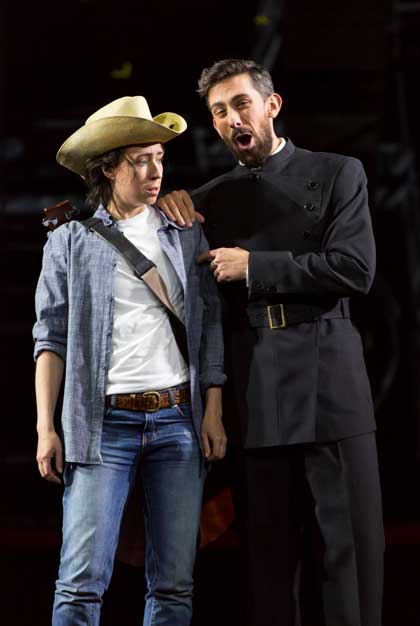Opera (1786)
Music by Wolfgang Amadeus Mozart
Libretto by Lorenzo da Ponte
Conductor: David Angus
Stage Director: Rosetta Cucchi
Set Designer: John Conklin
Boston Lyric Opera
John Hancock Hall at the Back Bay Events Center
Boston, MA
April 28 – May 7, 2017
With Evan Hughes (Figaro), Emily Birsan (Susanna), David Cushing (Bartolo), Michelle Trainor (Marcellina), Emily Fons (Cherubino), David Perhsall (Count Almaviva), Matthew Dibattista (Basilio), Nicole Heaston (Countess Almaviva), Simon Dyer (Antonio), Brad Raymond (Don Curzio), Sara Wonble (Barbarina), Felicia Gailanes (Bridesmaid), Emma Sorenson (Bridesmaid)

Evan Hughes as Figaro
in “The Marriage of Figaro”
Photo: T. Charles Erickson
Courtesy of Boston Lyric Opera
The story is too intricate to recount entirely, but suffice it to say that Count Almaviva (David Pershall) is a dallier and tries to make his way with Susanna (Emily Birsan), the maid and the fiancee of Figaro (Evan Hughes). The Countess (Nicole Heaston) is none too pleased with the Count’s dalliances and she and Susanna conspire to trick him in such a way that he’ll learn his lesson. Meanwhile, Figaro gets wrapped up in the intrigue as does Cherubino (Emily Fons), the young page, who seems to be in love with every woman he sees, and, in particular, with the Countess.
The collaboration between Mozart and his librettist Lorenzo da Ponte produced some of the greatest works of the musical canon, and one might well argue that The Marriage of Figaro is the greatest among the greats. The plot is intricate but plausible, the characters vivid and endearing, and the music is as close to divine as one might come.
The productions by the Boston Lyric Opera tend to make great successes out of relatively little stagecraft but this production is so inventively conceived that it supersedes even the high bar for the average BLO production.
Upon entering the house, one sees a curtain splayed with Figaro – A Work in Progress. The theme of the rough and ready production is to show the work with all of its pipes and valves exposed. Stage hands abound, delivering necklaces to characters onstage or wiping up messes as they occur. Backstage is visible from the sides. And more importantly, a large angled mirror sits above the stage showing the action behind – exactly which characters are eavesdropping at the back door, and plenty more. It all works marvelously well.
The music is carried off beautifully by Conductor David Angus and his crew; a special shout out must be given to the pianist, Brett Hodgdon, who adeptly accompanies the many recitatives throughout. Typically a harpsichord is used, but the piano works excellently well here. The orchestra is precise and right on the mark.
All of the singing is excellent, and gets better as the opera goes along. Right out of the box I found Evan Hughes’ (Figaro) voice vivid and compelling. And, the same goes for the Emily Fons’ (Cherubino) contralto, persuasively rich from the beginning. It took me a bit to sink in with Emily Birsan as Susanna, who seemed tonally fine but a bit less resonant at the outset; her voice warmed and widened nicely as the opera went on. This was true also of David Perhsall’s Count Almaviva and Nicole Heaston’s Countess Almaviva. Eventually ll of them had opportunities for great arias, and each rose to the occasion wonderfully well.
There is a vibrancy and level of irreverent fun in this production which makes it particularly delightful. The poignancy of the betrayal theme comes through strongly, but the informality of the setting and the general stance of the production that human relationship is a work in progress lends a sweet and relaxed tone to the whole affair.
This is a production not to miss.
– BADMan
Leave a Reply